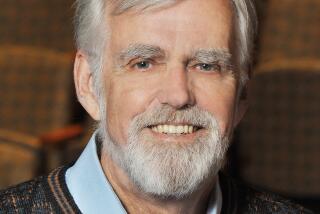STAGE REVIEW : South Coast Repertory Offers a ‘Glengarry’ Sans the Heat
- Share via
David Mamet is not known for the good manners he imparts to his characters. He is known for the terrific echo that reverberates in their voices. They speak in phrases that zap us, words we recognize instantly, including avalanches of four-letter ones. He writes of the American Dream in crisis--the crumbling ideologies and blurring visions--nowhere more pointedly than in his Pulitzer Prize-winning “Glengarry Glen Ross.”
This play, a production of which just opened on South Coast Repertory’s main stage, is about that bruised and rumpled star of the free enterprise system, the American salesman. As in Arthur Miller’s “Death of a Salesman,” we see the flip side of the calling. Miller dealt with individual tragedy, Mamet deals with the collective condition: a bunch of second-rate guys scrambling to survive by selling third-rate properties with exotic names to unsuspecting victims. His question: Will the real victims please stand up?
What Mamet has written, in fact, are three duologues and an act. In the first duologue (all three take place in a Chinese restaurant as sleazy in its decor as the conversations it harbors), we have Shelly Levene (Howard Witt) pleading with his office manager, John Williamson (Hal Landon Jr.), for better leads. Levene was a star once. He’s fallen on bad times. Williamson is a weaselly blockhead, and neither man is above a bribe--Levene above offering one, Williamson above accepting one. A trade is made: Williamson gets a piece of Levene’s action in exchange for two hot leads. Williamson doesn’t say no. He just drives a hard bargain. Greed rides again.
In the second duologue, we see two other salesmen doing a number on each other. Fast-talking Dave (Art Koustik) verbally tries to implicate slow-witted George (Don Took) in a scheme to rob the office of its own leads. He almost succeeds. And in duologue three we see prowling star salesman Richard Roma (Richard Doyle) pounce on unsuspecting victim James Lingk (Ron Boussom), ripe for the pouncing. That’s the preamble.
Act two is the fall. The office has been robbed and ransacked of its leads. A cop (Harold Surratt) is questioning everyone. We watch Lingk trying weakly to fight back. We watch the American Dream collapse. It does not die an easy death.
What we really witness is a microcosm of society cannibalizing itself. The image is gruesome. When the dream chokes on itself, sellers and buyers both are doomed. Mamet is good at depicting that. In “American Buffalo,” he showed us the insidious force of frustration and unintentional violence; in “Glengarry” we are staring at largely self-inflicted wounds.
Played to the hilt, its ruthlessness going full tilt, this reflection of ourselves should make us shiver slightly as we leave the theater. At South Coast, however, director David Emmes has provided a staging that’s a little too well-bred. His actors speak the words (including the four-letter ones) and go through the motions, but don’t always seem to believe them. There’s too much restraint. At gut-level where it really counts, they lack the needed vulgarity--the crassness, blood, sweat and tears that it takes to really sell us these characters. We miss the heat.
Witt manages to rally some momentum in the second act, becoming more persuasive as the raunchy Levene and Doyle has isolated moments of passion as Roma, but it’s not enough. The production as a whole has a lingering veneer of coolness and gentility where it should be coarse. Even Surratt’s investigating cop seems like a decent sort, instead of the rough hard-driving type who isn’t about to leave the premises until he’s nailed someone.
Cliff Faulkner’s sets, functionally lit by Paulie Jenkins, are right in line with the crummy milieu they depict, but Dwight Richard Odle’s costumes could be more garish. More garishness all around is what this “Glengarry” needs.
Performances at 655 Town Center Drive in Costa Mesa run Tuesdays through Saturdays at 8 p.m., Sundays at 7:30 p.m., with matinees Saturdays and Sundays at 2:30, until Dec. 3. Tickets: $18-$25; (714) 957-4033.
More to Read
The biggest entertainment stories
Get our big stories about Hollywood, film, television, music, arts, culture and more right in your inbox as soon as they publish.
You may occasionally receive promotional content from the Los Angeles Times.










